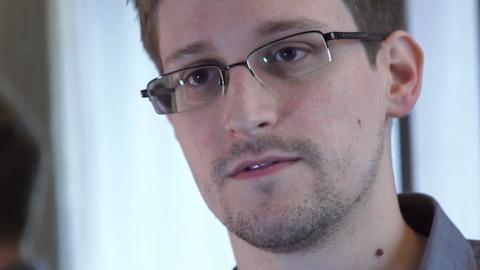Speaking to CNN's David Axelrod on a recent podcast, former U.S. Attorney General Eric Holder made waves by suggesting that in leaking classified intelligence documents, Edward Snowden "actually performed a public service by raising the debate" about surveillance techniques.
Though he was also quick to emphasize that Snowden should face consequences for his illegal actions, Holder's comments come at a time when the conversation around Snowden is poised to shift — in the wrong direction. The trailer for a new movie from Oliver Stone called "Snowden" foreshadows a tale of an American hero who risked everything for the sake of the U.S. Constitution and the Fourth Amendment protections of his fellow citizens. The villain, in typical Hollywood fashion, appears to be the U.S. government and its supposedly immoral and predatory National Security Agency.
Portraying the actions of Snowden and the U.S. government in this way is both outrageously counterfactual and utterly shameful. Before Americans use the trailer to decide whether to pay to watch "Snowden," they should revisit the facts surrounding his security breaches, as well as the events that directly followed and continue to this day.
First, Snowden did not take only files that were related to domestic surveillance programs. According to the NSA, he had access to over 1.5 million highly classified files, of which a tiny portion were related to domestic surveillance, and many believe he stole everything he had access to. Multiple media outlets have reported that this includes intelligence related to highly sensitive military and nuclear technologies. It also includes information on operations by the United States and our allies in the ongoing conflicts in the Middle East. In fact, some of what Snowden leaked, according to U.S. intelligence officials, has caused terror groups to "go dark," eluding Western intelligence.
In one instance, because of the leaks, the Afghan government closed a critical U.S. intelligence program, which Director of National Intelligence James Clapper said "was the single most important source of force protection warning for our people in Afghanistan." In other words, the consequences of Edward Snowden's actions directly threatened the lives of American men and women serving in harm's way.
If the thought of the damage Snowden's leaks did to counterterrorism operations is not enough, consider the human cost of making the fight against terror more difficult. It has been publicly reported that Snowden's leaks prompted terrorists to adjust their tactics and ISIS militants explicitly referenced Snowden in their manual explaining how to hide communications while planning and executing attacks. Given the carnage wrought by ISIS and other terror groups, how could anyone portray Snowden — whose actions made it easier for terrorists to plan attacks — as a hero?
As former CIA Director James Woolsey has said of Snowden, blood is on his hands.
Second, Snowden had multiple avenues to pursue whistleblower status for the perceived infractions, both within his agency and through Congress, and availed himself of none of those options. Instead, Snowden went directly to the most damaging course: He disclosed critical national security secrets to the news media, which printed the secrets for all to read. Russia, China, Iran, North Korea and terrorist organizations like ISIS now have a better idea how to hide from Western intelligence and how to defeat us on the battlefield.
Then, rather than submitting himself to the U.S. justice system, he fled first to China and then to the authoritarian Russia, a nation openly hostile to the United States and our NATO allies, a nation with government-controlled press and censored internet, with no significant political opposition, and whose outspoken government critics often die mysteriously. This belies Snowden's insistence that his actions were motivated by patriotism and a desire to protect civil liberties.
Third, the domestic surveillance program that Snowden publicly exposed to America's enemies continues to this day. The laws that govern this program were signed by the Bush administration and were reauthorized by the Obama administration. The Foreign Intelligence Surveillance Court repeatedly approved the use of the program. In fact, 19 federal judges ruled in favor of the metadata records program 40 times in the past 10 years. Data collected on a U.S. person cannot be utilized by law enforcement without a specific court order. Congressional committees with oversight responsibilities over U.S. intelligence were also aware of this program. Both Republicans and Democrats familiar with the program supported its use.
The recent legislative reforms to the program shifted the owners of the telephone metadata and intelligence from the government to private companies. But the U.S. government still has access to them when it conducts a search on a suspected or known terrorist. The reforms may have slowed down the government's work, to the detriment of our security, but they did not stop it. The result of the Snowden leaks is simply a slower, more inefficient program.
It's time to recognize Edward Snowden for what he is. And regardless of whether you take Holder's view that our national conversation about surveillance has been a "public service," the "Snowden" movie is just a vehicle for entertainment that has made itself an outlet for anti-American propaganda.


















